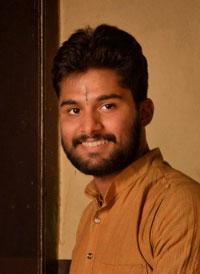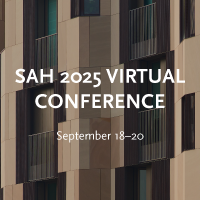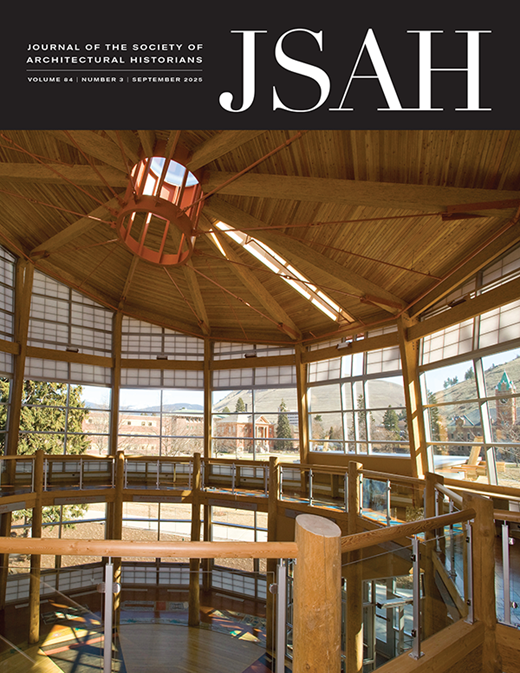-
Membership
Membership
Anyone with an interest in the history of the built environment is welcome to join the Society of Architectural Historians -
Conferences
Conferences
SAH Annual International Conferences bring members together for scholarly exchange and networking -
Publications
Publications
Through print and digital publications, SAH documents the history of the built environment and disseminates scholarship -
Programs
Programs
SAH promotes meaningful engagement with the history of the built environment through its programs -
Jobs & Opportunities
Jobs & Opportunities
SAH provides resources, fellowships, and grants to help further your career and professional life -
Support
Support
We invite you to support the educational mission of SAH by making a gift, becoming a member, or volunteering -
About
About
SAH promotes the study, interpretation, and conservation of the built environment worldwide for the benefit of all
SAH Names 2023 SAH IDEAS Research Fellows
Nov 30, 2022
by
SAH News
The Society of Architectural Historians is pleased to announce the recipients of the 2023 SAH IDEAS Research Fellowship. Part of the SAH IDEAS Initiative, the fellowship is intended to create mentored cohorts of emerging scholars who self-identify as members of marginalized groups as well as to support research that challenges existing paradigms and represents previously under-recognized and/or unsupported directions for architectural history.
The SAH IDEAS Committee is deeply grateful to the senior scholars who have generously agreed to contribute their time to support the fellows as mentors. Throughout the year, the cohort will meet with each other regularly to foster relationship building and encourage peer support. The fellowship includes one year of SAH membership and a $1,000 award for research support.
The 2023 SAH IDEAS Research Fellows are listed below along with the names of their mentors.

Sushant Bharti
Sushant Bharti is a conservation architect and researcher based in New Delhi whose broad interests lie in understanding the diverse architectural heritage of India. His area of research is the cultural heritage of Braj, known for its complex religious setting and architecture. He has previously practiced with the National Museum, New Delhi, to document cultural heritage in Uttar Pradesh and Ladakh. As part of this work, he was tasked with conceptualizing designs for new museums at other canonical sites: Kashi Vishwanath and Kedarnath. He is a keen advocate for the protection of the tangible and built heritage of the Braj region. He was selected by the National Book Trust of the Ministry of Education in India to write a book on the Indian Independence movement.
As a practicing conservation architect, the IDEAS fellowship will facilitate Bharti’s examination of architectural histories of complex cultural landscapes, which are more often than not simplistically reduced to ‘temple towns.’ His interest is the cultural heritage of the Braj region. He is interested in grappling with its complexity at the scale of the religious building or hereditary craft workshops, studying its 'temple towns' and the interrelation of the communities within which they are arguably integrated. He hopes to use the IDEAS fellowship to enable him to communicate their complexity through his research and practice.
Mentor: Vishal Khandelwal, Postdoctoral Fellow, Department of History of Art and Architecture, Harvard University

Yakin Kinger
Yakin Kinger is an architect presently working as a teaching associate at CEPT University. His current research lies at the threshold of landscape histories and postcolonial studies, closely looking at the transformations in cultural landscapes in India during the nineteenth and early twentieth centuries. His research aims to develop and apply a methodology that gives agency to landscape architectures to offer a new reading of history. Among other things, he learns and plays the sitar.
Kinger’s research looks at Baghs (gardens) as sites of violence during the uprising of 1857 and critically examines the transformations and relegations they underwent between 1857 and 1947. Many Baghs in cities and towns such as Delhi, Lucknow, and Jhansi were sites of violence during the events of the First War of Independence. Following the uprising, the colonial state incorporated suppressive measures to appropriate, dismantle, and/or erase the Baghs, as they were seen as spaces that sheltered revolutionaries. The inquiry reads against the colonial grain by decoding imperial agendas and actions to develop a generative method for incorporating the cultural landscapes as the framework of analysis. The study intends to theorize the transformations that followed and develop an approach addressing the void in scholarship.
Mentor: Daniel M. Abramson, Director of Architectural Studies, Professor of American & European Architecture, Boston University
.jpg?sfvrsn=43c8219b_2)
Divya Kumar-Dumas
Photo credit: Patricia Canino
Divya Kumar-Dumas is a historian of South Asian art and architecture, specializing in the designed landscapes of first millennium South Asia. Influenced by methods from studies of word and image, gardens and landscapes, archaeology and text, cultural and oral histories, and folk and traditional arts, she treats built landscapes as conceptually driven architectural projects of the past and invitations to experience a place over its long, layered afterlife. She finds this phenomenon of 'place-ness' key to reading cultural and design histories within the landscapes of first millennium South Asia. Currently a research affiliate at the Institute for the Study of the Ancient World (ISAW) at NYU, and affiliated faculty in the Department of Art History, Theory, & Criticism at MICA, she received her PhD from the Department of South Asia Studies, University of Pennsylvania. Her dissertation reads two well-known archaeological sites as designed landscapes from their visitor records and archaeological traces.
Her first monograph, The Frisson of Poetry on a Wall in Lanka, treats an important landscape architectural moment in the life of Sigiriya, an archaeological site in Sri Lanka, when more than 1,800 visitors recorded their experience of the place by writing onto a wall built onto its metamorphic rock face. This seventh-century architectural intervention tells an occluded story about the site from which the book argues that the designed landscape of Sigiriya constructed new literary communities writing in Sinhala to transform events in the cultural history of Lanka. It grapples with place-making, community-building, and the role of writing and design in those processes. She has published on Sigiriya in Orientations (Jan/Feb 2018) and Art, Architecture, and the Moving Viewer, c. 300–1500 CE: Unfolding Narratives, G. Elliott and A. Heath, eds. (Brill 2022).
Mentor: Anooradha Iyer Siddiqi, Assistant Professor of Architecture at Barnard College of Columbia University


